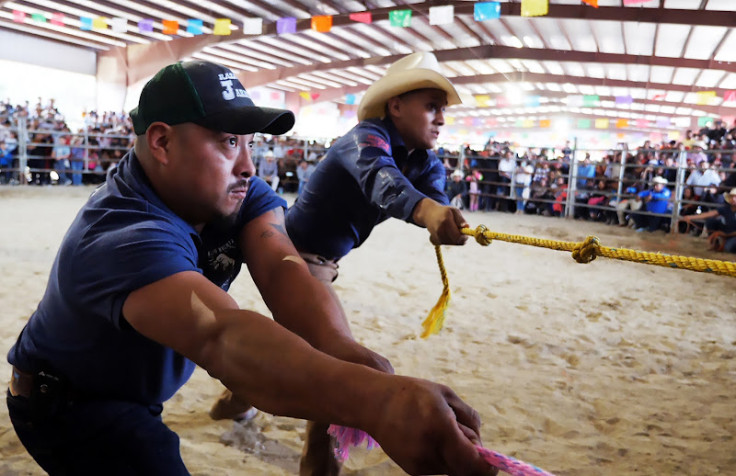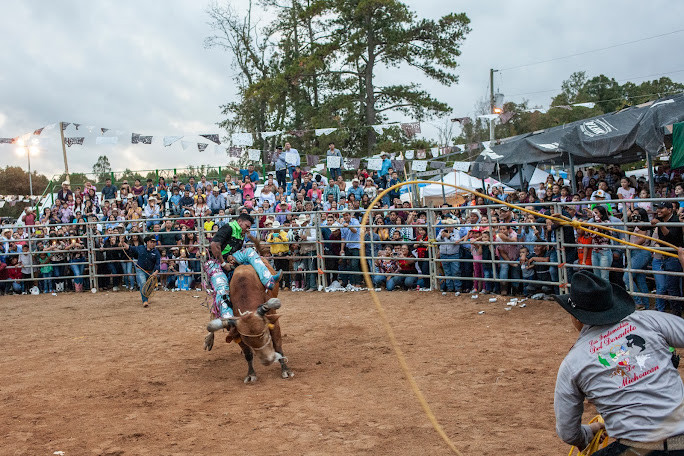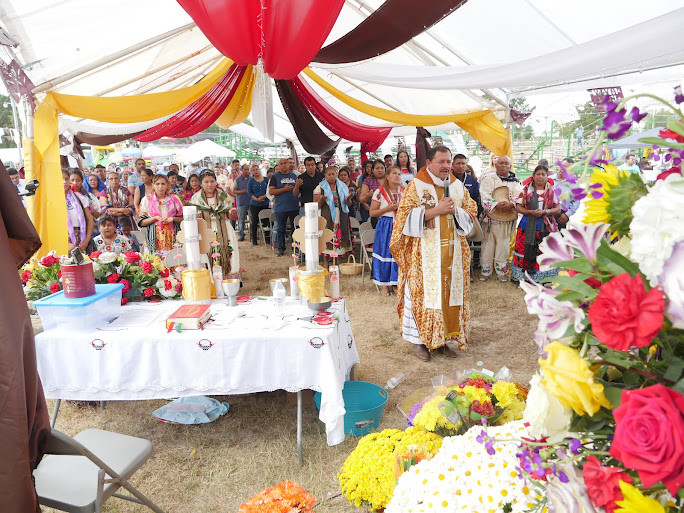
National Immigrants Day provides an opportunity to take a step back from the frantic daily conversation and look at stories that show another side of migration, one of empowerment and success, of settlement and a newfound sentiment of community
That is one of the messages sought to convey by Bulls and Saints, a new documentary from Chilean filmmaker Rodrigo Dorfman and producer Peter Eversoll. A coproduction by Latino Public Broadcasting, it follows an undocumented family from North Carolina and their daily life, which intertwines its routine within their community in North Carolina and their yearn to return their hometown, Cheran, in Mexico, after almost 20 years.
In an interview with Latin Times, Dorfman discusses the film's coming to be, its development and main takeaways. But also the broader subjects it covers: migration to the area he defines as the "Nuevo South" and their integration (or lack thereof) in the wider American society. Bulls and Saints can be watched in PBS until December 17.
The following conversation has been edited for extension and clarity purposes:
How did the idea for the documentary come about?
For me, it's never really about an idea. They come after as you start going into the world of your participants and their universe, both physical and emotional. I met Tacho (one of the documentary's protagonists) in a jaripeo (a sort of rodeo). One thing led to another and we ended up being invited to his son's quinceañera. He was giving his boy one in which he would get to pull the door for a bull at a jaripeo.
We became friends, peter taught Tacho's kid how to drive, that sort of intimacy. At some point we saw a story there, one that echoed my own story of exile because I lived in exile most of my youth, a story of distance and nostalgia and loss and what it feels like to live between two worlds.
Why did you decide to settle in North Carolina?
I've traveled around the world and when I started seeing these transformations I decided to stay. It's one of the most vibrant places that I have ever seen. Imagine if you were in Brooklyn in 1920's, the Italians had just arrived and you had a camera and the technology we have today. Here it's like that but instead of Italians you have Mexicans.
I've been one of the main chroniclers of the great Latino migration to the South. There is something going on every day and that's why now I'm working on training Latino youths who have finally come of age. There's just too many stories and I can't do them all.
How is that working out?
if I'm going to be consequential with my community involvement, my activism and my desire to empower communities, I have to help them tell their own stories. I am giving them the space to create and guidance, which doesn't exist at an institutional level.
If we don't tell our stories, 50 years from now, we're going to be like the Italians, who forgot most of their recipes. Not to insult them, that's just how the U.S. assimilates you into whiteness. That's the story and the question is can we as Latin Americans in the South find a different way to enter into the conversation of a more perfect union, especially with the 250th anniversary coming up in 2026.

What topics have they shown the most interest in?
There are two main groups of youths I'm working with. The DACAs and those born here. They all carry a very heavy burden from the fact that most of their partents are undocumented. It's a very high proportion and many are trying to figure out how to tell their parents' stories.
How have you seen your community change in the decades you've spent there?
I like to use the word communities, it's a very important distinction. What makes it so exciting is that there were no preset boundaries where one could say "the Salvadorians live here, the Peruvians there." So there's a very interesting mix of Latin Americans who would never ever before in their lives come together.
As for the changes now, people are now settling down in large quantities. The big difference is that the people that came recently brought their wives with them or did it very soon. Before, it was just the man. And the kids who were born during that boom are now coming of age.
I would say the most fascinating part about this is how we're trying to slowly make a home for ourselves and the home can't just be consumption. Not just buying a TV or a truck, but also to be able to express ourselves culturally and go into public art and storytelling, that's what I'm hoping for.
People were running for a long time and had very little time to think about why. We were just trying to get our children something better. Now the community has finally stopped running, and when that happens you start sweating and then you start also yourself questions. "I haven't seen my mother in 20 years because if I go back I can't go back which is the Bulls and Saints issue of reverse migration. Was it worth it? Why did I do this?" and you start asking yourself deep questions about belonging.
So it's a very interesting moment right now. A key moment in which I tell everyone that in the next five years. We need to be very much aware of creating institutions that are culturally representative of us and be aware of archival memory because 50 years from now if we don't do this Intentionally we're gonna disappear.
How do you see these communities, which are not running anymore, engage with the broader, national conversation?
For many years these communities suffered the brunt of immigration National policies that began shortly after 9/11. In North Carolina there are these laws where if you're undocumented you cannot have a driver's license. They won't give them one but they will take their labor. So they bear the brunt of these national screaming matches of opportunistic politicians, pointing fingers at scapegoats right in order to gain power.

There's another big challenge and it is low voter turnout. Voters between 18 and 30, we only had 14% of them vote in 2020 and 2022. the national average Was 27 in 2022 which was much higher. Why are we so radically below average? It's because they don't feel like they belong yet because they look out and they don't see institutions that have their face or their names because they grew up in a school system where they were the token Latinos.
We're not there yet. We're at the level where we're trying to figure out how can people feel like they literally belong so that it matters to them so that there's a reason to vote.
What is one thing you'd want people to take away from the documentary?
I want people to have an experience of the Latino migration that is outside the major headlines, what I would call trauma and victimization. Deportations and kids in cages. They are important and necessary because they're true, but oftentimes we are reduced to victims and the richness of our experience is minimized, as well as our capacity for cultural empowerment.
I wanted to create the experience of not only of showing the cultural written richness of these communities who've come to the South with nothing and they've created something amazing. And they'd be able to create these traditions and perpetuate them and transmit them.
Their dream is to become a better human being, to give their children what they need and take ownership of their lives. And then take that and decide to stay or to go home. Some people would like to be able to go home and see their children and grandchildren. And to me that's one of the greatest takeaways: if you want migration reform, if you have issues with migrants, the best way to deal with it is to actually give them papers because if you did, many would go.
© 2025 Latin Times. All rights reserved. Do not reproduce without permission.





